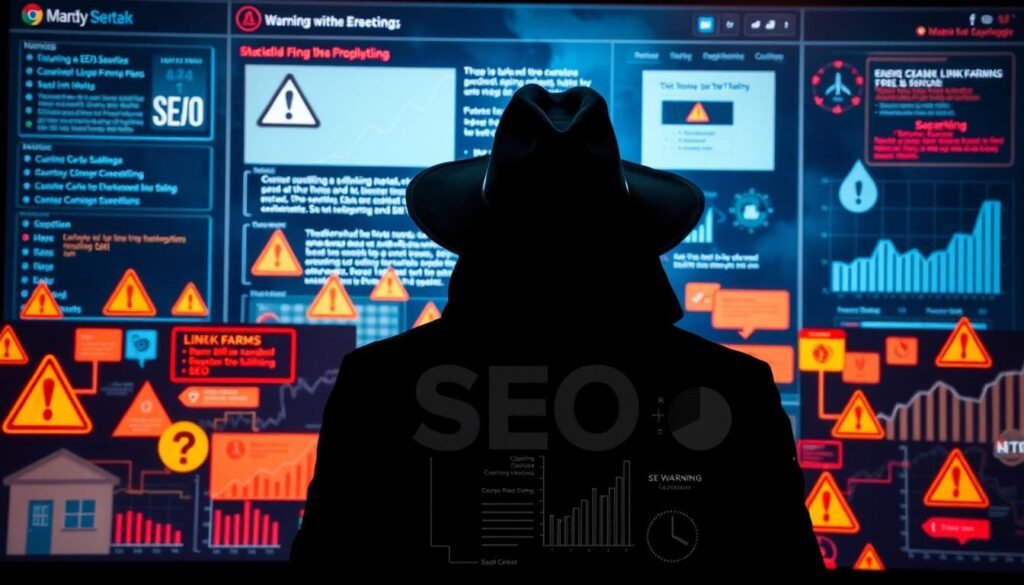Did you know that 90% of websites have faced Google’s algorithm updates? These updates aim to catch and punish black hat SEO tricks like buying links and keyword stuffing1. At first, these tactics might seem to work, but they don’t last. Once Google spots them, your site’s traffic will drop1.
In the past, many marketers used black hat SEO to beat their rivals. But now, these methods are not only outdated but also risky2. Today, we’ll look at some common black hat SEO examples and why they’re harmful to businesses and website owners.
Key Takeaways
- Black hat SEO tactics can lead to severe declines in organic traffic, decreased visibility, and possible loss of income.
- Google’s algorithm updates are designed to identify and penalize unethical SEO practices, such as buying links and keyword stuffing.
- Black hat techniques divert focus from user experience, which is critical for building trust with users and search engines.
- Search engines have advanced algorithms that can recognize and neutralize common black hat tactics, rendering them ineffective in the long run.
- Investing in customer-oriented SEO strategies is the key to long-term success and sustainable growth.
What is Black Hat SEO?
Black hat SEO is a term in digital marketing. It means using unfair ways to get a website to rank higher in search engines3. These methods ignore search engine rules. They aim for quick traffic boosts, not lasting success for the site and its users.
The Nature of Black Hat Practices
Black hat SEO tricks involve fooling search engine algorithms. This is different from white hat SEO, which focuses on making websites better for users and follows search engine rules3. Black hat SEO ignores these rules, focusing only on their own goals.
Tactics Used by Black Hats
- Keyword Stuffing: Stuffing content with too many keywords to trick search rankings4.
- Private Blog Networks (PBNs): Creating fake websites to get more backlinks and boost site authority4.
- Content Duplication and Article Spinning: Making or copying low-quality content to fool search engines4.
- Link Buying: Buying backlinks to make a site look more important and rank higher4.
- Doorway and Gateway Pages: Making pages to send users to other pages with lots of keywords4.
These methods are seen as black hat SEO by search engines. They can lead to big penalties, like being removed from search results5. The effects can be huge, cutting off a site’s traffic and hurting its online image5.
“Black hat SEO techniques are a short-term solution with long-term consequences. They may provide a temporary boost in rankings, but the risks of being penalized by search engines far outweigh any possible benefits.”
Risks and Consequences of Implementing Black Hat SEO
Black hat SEO promises quick results. But, techniques like keyword stuffing and content automation can harm your site. Over 50% of websites saw significant traffic drops after being penalized by Google6.
Recovering from a penalty takes months, not days. Websites employing black hat SEO risk being removed entirely from search engine indexes or facing algorithmic penalties7. This can hurt your traffic and sales.
Short-Term Success vs Long-Term Damage
Implementing black hat SEO can lead to a decline in organic traffic, affecting conversions and revenue generation6. It also makes your site less user-friendly. The benefits are not worth the risks.
Websites using black hat SEO techniques face penalties such as de-indexing by Google, resulting in a drop in traffic to zero7. Google frequently updates its algorithms to combat black hat SEO tactics, impacting sites that rely on such methods7. Stick to ethical SEO for better results.
Stay away from black hat SEO tactics like keyword stuffing and hidden text. Keyword stuffing, duplicate content, hidden text, doorway pages, cloaking, manipulative links, misuse of structured data, misleading redirects, and negative SEO practices8. Focus on creating valuable content that meets search engine guidelines678.
Keyword Stuffing & Content Automation
Search engines are getting smarter, making black hat SEO tactics like keyword stuffing and content automation less effective9. Keyword stuffing, where too many keywords are used, hurts user experience and trust9. Content automation, which creates content without humans, often lacks the depth and originality users want.
The Impact of Duplicate Content
Duplicate content is a big problem with these tactics9. It can confuse users and hurt a website’s search rankings10. Search engines favor unique and valuable content10. For example, J.C. Penney’s rankings dropped by nearly seventy positions after using black hat link building methods10.
The Pitfalls Of Automated Content Generation
Content automation might seem like a quick fix, but it often fails to deliver engaging content9. Search engines penalize websites that use black hat SEO, leading to lower rankings or even removal from search results9. Using these tactics can also damage a website’s reputation, losing user trust and loyalty9.
Remember, black hat SEO might offer quick gains, but these are short-lived due to algorithm updates9. For lasting success, focus on white hat SEO that values user experience and authentic content.
Link Schemes & Manipulation
Link schemes and paid links are part of the dark side of SEO. You might have heard of ‘link farms’ or ‘paid links’. But what do they really mean? These tactics can really hurt your site’s standing with search engines11.
Buying backlinks might seem like a quick fix for better rankings. But it’s not worth it. When Google finds out, which they always do, it’s trouble. Google sees this as a big no-no, violating their rules. It’s like trying to cheat instead of earning those links with good content and real marketing11.
| Tactic | Consequence |
|---|---|
| J.C. Penney’s link building scheme | Their keywords dropped from page 1 to page 5 after Google penalized them11. |
| Sea Wall/A Life’s black hat tactics | The website was eventually de-indexed by Google11. |
| DoNotPay’s mass programmatic/thin content pages and broken redirect chain | They experienced a dramatic decrease in monthly visitors from ~2 million to 500,000 in less than 1 month11. |
Industry data12 shows many sites get hit for using shady SEO tricks. The exact number isn’t known, but the effects are big. Also, how long these tricks work changes as search engines get smarter12.
Link schemes and manipulation are big risks for your site. They can really hurt your site’s performance and reputation. It’s better to stick with honest, quality SEO practices instead11.

The Dangers of Buying Links
Thinking about buying links to boost your site? It’s a bad idea. Buying links might seem like a quick fix, but it’s risky13. They cost a lot, with an average price of $361.44 in 201814. More than 50% of sites lost a lot of traffic after Google penalized them for buying links.
Google doesn’t like this practice. They see it as trying to cheat the system instead of earning links honestly. And they always catch on14. Getting out of penalties can take months.
Avoiding Link Farms Like the Plague
Link farms are another bad trend. They’re networks of sites made just to sell links15. Buying links is against Google’s rules, and link farms try to get around these rules15. Getting penalized can hurt your whole site, not just some pages.
Don’t believe the lies of link farms15. Google doesn’t like schemes like free stuff for links or hidden links15. You can disavow bad links, but it’s better to avoid them.
The dangers of buying links or using link farms are too great14. Google doesn’t like stuffing keywords, which hurts users14. Black hat SEO, like automated content, lacks real value14. It’s not worth risking your site’s future.
“Shortcuts may get you there faster, but the long way round will make a better man of you.” – C.S. Lewis
Instead, make high-quality content that people want to link to. This is a better, lasting strategy.
Cloaking: A Game of Deception
In the world of search engine optimization (SEO), cloaking is a risky tactic. It means showing different content to users and search engines. This is done to rank a page for search engines while showing users something else16.
Cloaking breaks Google’s Webmaster Guidelines and can lead to severe penalties. This includes being removed from their index16. Websites with lots of multimedia content often rank poorly because search engines struggle with non-text content16. Techniques like user agent and IP cloaking are used to trick search engines16.
The effects of cloaking can be severe16. Search engines, like Google, penalize sites that use cloaking. This hurts the site’s visibility, clicks, and PageRank flows16. Methods like the Japanese Keyword Hack use cloaking to manipulate rankings16.
To avoid cloaking’s dangers, follow holistic SEO guidelines. Focus on creating content that truly helps your audience16. In 2020, Google and others got stricter on webspam, lowering trust scores for violators16.
“Cloaking is a clear violation of Google’s Webmaster Guidelines and can result in severe penalties, including the removal of your site from their index.”
As the digital world changes, it’s vital to align your SEO with search engine best practices. Use transparent, user-focused strategies to build a lasting online presence17.
Black hat SEO, like cloaking, might seem to work at first. But it can harm your brand’s reputation and search visibility in the long run17. It can take up to six months for new pages to reach the top of search results17. So, it’s important to stick to approved strategies to improve rankings and user experience17.

By sticking to white hat SEO and avoiding tricks, you can create a strong online presence17. Success in search engine marketing comes from adapting and using ethical, user-focused strategies. These must align with the guidelines of leading search engines17.
Rich Snippets & Structured Data Abuse
Some SEOs misuse rich snippets and structured data to cheat the system. They add wrong or misleading tags to their sites, hoping to rank higher in search results18. But, this breaks Google’s rules and can lead to big penalties if caught19.
Using rich snippets and structured data the wrong way hurts a site’s visibility. It also makes users doubt the accuracy of search results18. Giving out fake ratings or reviews can trick and upset users. This can harm the whole search system19.
Risks of Misusing Rich Snippets and Structured Data
Google strongly opposes the misuse of rich snippets and structured data. They penalize sites that do this19. These penalties can drop a site’s ranking or even remove it from search results. This can really hurt a site’s online presence and traffic19.
Abusing rich snippets and structured data can also lose user trust. It can lead to more people leaving the site and fewer coming back19. When search results are misleading, users are less likely to visit the site. This can hurt a business’s ability to get new customers and make money20.
Using rich snippets and structured data correctly can help users make better choices18. But, using them to cheat search rankings can damage the search experience. It can also hurt the site that’s doing it19.
Website owners and businesses should be careful with rich snippets and structured data. They should follow search engine rules19. Focusing on user experience and giving accurate info is key to success online20.
black hat seo examples
SEO strategies have changed over time. Some people use “black hat” tactics to get ahead unfairly. These examples show the dangers of cheating and can hurt a website’s future2122.
Keyword stuffing is a common trick. It means filling content with the same keywords to rank higher. But, it makes content hard to read and can get a website banned21.
Buying backlinks is another bad tactic. It breaks Google’s rules and can get a site penalized2122. Article spinning, copying content, also gets penalties for being copied21.
Using schema markup wrong can also hurt rankings21. Creating webrings or Private Blog Networks (PBNs) to fake higher rankings is against Google’s rules21.
Cloaking is very sneaky. It shows different content to search engines than users see. This is a big no-no and can get a site in trouble23.
Knowing about these bad tactics helps avoid them. It’s better to stick with honest SEO methods that help your site in the long run212223.

“The short-term gains of black hat SEO tactics are often outweighed by the long-term damage they can inflict on a website’s reputation and visibility.”
The Allure of Black Hat SEO
Black hat SEO tactics are risky, but some find them tempting. They promise quick results and better search rankings. This is appealing to those impatient or looking for a quick fix24. But, the long-term effects are often worse than any short-term benefits.
Black hat SEO’s main draw is its promise of fast gains. Methods like keyword stuffing and content automation can quickly improve a site’s search visibility24. Link schemes and link buying can also artificially boost rankings24. Techniques like cloaking can temporarily increase rankings by showing different content to search engines and users24. Yet, these methods are unsustainable and can cause lasting harm.
Another reason people are drawn to black hat SEO is the perceived benefits. Owners might think these tactics will help them outrank competitors and get more visibility2425. This is tempting, mainly for those in crowded or competitive markets.
But, the charm of black hat SEO is fleeting, and the penalties are severe. Search engines keep improving their algorithms to catch and punish these unethical methods. The penalties can be harsh, causing significant drops in traffic and even removal from search results2425.
In conclusion, the allure of black hat SEO is an illusion that can harm a website’s reputation and presence. It’s better to stick with ethical, sustainable white hat SEO practices.
Staying White Hat – Best SEO Practices
White hat SEO is all about doing things right and following the rules. It’s about making great content, getting real backlinks, and making websites better for everyone. This way, you can keep your site safe from harm and grow in a good way.
Understanding White Hat SEO Tactics
White hat SEO is about growing your site’s ranking in a safe and steady way. Websites that earn their place through real connections and content sharing have seen big improvements and built strong relationships.26 It’s all about making your site valuable to users, just like Google wants. This means creating original content and making your site fast, easy to use, and mobile-friendly27.
Good white hat SEO also means using keywords wisely, adding important details like page titles and alt text for images27. And it’s about linking your site’s pages in a smart way27. These actions help you connect with your audience in a meaningful way and keep your site safe from harm.
“A website doubled its traffic in six months by focusing on high-quality, informative content tailored to its audience’s needs.”26
On the other hand, black hat SEO tries to cheat the system for quick wins, ignoring what’s best for users. Google has cracked down on these tricks with updates like Florida, Panda, and Penguin.26 If you get caught using black hat tactics, you could lose your spot in search results. This means fewer visitors, less business, and lost sales26.

Knowing the difference between white hat and black hat SEO helps you make smart choices. Choose the path that leads to lasting success and a good reputation online.
Avoiding Black Hat Techniques
It’s vital for website owners and marketers to avoid black hat SEO tactics6. These unethical practices can lead to severe penalties, like being removed from search engines or seeing a big drop in traffic6. Most of the SEO industry sees black hat techniques as completely wrong6.
To dodge black hat SEO, you must know the search engine guidelines well2. Focus on making content that’s truly valuable and improves the user experience2. Search engines like Google keep updating their algorithms to catch and punish manipulative tactics, such as keyword stuffing and duplicate content2. They also promote white hat SEO, which puts the user first2.
- Learn Google’s Webmaster Guidelines and make sure your website follows them2.
- Create high-quality content that helps your audience, not just for search rankings2.
- Build a natural link profile by getting backlinks through guest posts and partnerships2.
- Keep an eye on your website’s performance and adjust as needed2.
By choosing white hat SEO and focusing on sustainable growth, businesses can build a lasting online presence2. The allure of quick wins from black hat SEO is tempting, but the damage to your website’s reputation and visibility is too great28.
Search engines are always changing, and what works today might not tomorrow2. By being careful, sticking to ethical practices, and focusing on a good user experience, you can ensure your website’s success and avoid black hat SEO’s pitfalls28.
Conclusion
The temptation of quick wins with black hat SEO is strong. Yet, the dangers and downsides are much greater than any short-term benefits29. Companies like J.C. Penney and Forbes.com learned this the hard way. They faced harsh penalties from Google, losing visibility, traffic, and trust.
Google’s algorithms are good at spotting black hat SEO tricks29. The penalties can hit hard and fast, hurting a site’s visibility and traffic over time29. Tricks like keyword stuffing and buying links might seem to work at first30. But they can damage a site’s ranking and reputation, sometimes even removing it from search results.
For lasting success, it’s best to stick with white hat SEO29. Focus on creating valuable content, getting real backlinks, and following search engine rules. This way, businesses can grow steadily and avoid the dangers of black hat SEO29. Success in SEO comes from following the best practices and focusing on value, transparency, and a great user experience.
FAQ
What is black hat SEO?
What are some common black hat SEO tactics?
What are the risks and consequences of implementing black hat SEO?
How does keyword stuffing and content automation negatively impact a website?
Why are link schemes and buying links considered unethical?
What is cloaking, and why is it a dangerous black hat tactic?
How can the misuse of rich snippets and structured data harm a website’s visibility?
What factors contribute to the appeal of black hat SEO tactics?
How can website owners and marketers avoid the risks of black hat SEO?
Source Links
- Steering Clear: A Rundown on Risky Black Hat SEO Techniques – https://www.janbaskdigitaldesign.com/blogs/risky-black-hat-seo-techniques/
- What Is Black Hat SEO? 9 SEO Tactics To Avoid (2023) – Shopify – https://www.shopify.com/blog/black-hat-seo
- An Introduction to Black Hat SEO – https://blog.hubspot.com/marketing/black-hat-seo
- What is Black Hat SEO? Definition – SEO Glossary – https://growhackscale.com/glossary/black-hat-seo
- What Is Black Hat SEO? – https://www.wordstream.com/black-hat-seo
- What Is Black Hat SEO? 9 Risky Techniques To Avoid – https://www.semrush.com/blog/black-hat-seo/
- What Is Black Hat SEO? Exploring Its Dangers – https://www.singlegrain.com/blog/ms/what-is-black-hat-seo/
- Black Hat SEO : definition, risks, techniques and examples – Keyweo – https://www.keyweo.com/en/seo/glossary/black-hat/
- Black Hat SEO – Definition, Techniques and Why Avoid? – GeeksforGeeks – https://www.geeksforgeeks.org/black-hat-seo-is-it-really-worth/
- What is Black Hat SEO: 17 Techniques and 5 Examples – https://www.holisticseo.digital/theoretical-seo/black-hat
- 14 Black Hat SEO Examples & Case Studies – https://www.seocasestudy.com/seo-examples/black-hat-seo
- An Introduction to Black Hat SEO – https://leadg2.thecenterforsalesstrategy.com/blog/an-introduction-to-black-hat-seo
- 6 Risky Black Hat SEO Tactics to Avoid (And Their White Hat Alternatives) – https://ahrefs.com/blog/black-hat-seo-tactics/
- Black Hat SEO Exposed: Risky Tactics and How to Avoid Them – https://blog.whitehat-seo.co.uk/black-hat-seo
- 17 Black Hat Techniques That Can Harm an SEO Campaign – https://www.searchenginejournal.com/11-black-hat-techniques-can-kill-seo-campaign/180601/
- What is Cloaking for Search Engine? – https://www.holisticseo.digital/theoretical-seo/cloaking/
- Black Hat SEO: What You Can Do to Avoid Search Penalties – https://www.telerik.com/blogs/black-hat-seo-what-you-can-do-avoid-search-penalties
- Faking the SERPs – Rich Snippet Hacks, Penalties & Author Removal Alternative – https://cognitiveseo.com/blog/6201/faking-the-serps-rich-snippet-hacks-penalties-author-removal-alternative/
- Content Marketing Strategy: What Is White Hat and Black Hat SEO? – https://lightningmediapartners.com/what-is-white-hat-and-black-hat-seo/
- Black Hat SEO – How to Avoid Getting Hammered? – https://www.thedallasseocompany.com/blog/dangerous-black-hat-seo-techniques-to-avoid
- Black Hat SEO Techniques: Everything You Need to Know – https://www.elegantthemes.com/blog/wordpress/black-hat-seo-techniques-tactics
- What is black hat SEO and why to avoid it | Modo25 – https://modo25.com/news-insights/seo/what-is-black-hat-seo-and-why-to-avoid-it/
- Black Hat SEO – Techniques and Examples – https://trainings.internshala.com/blog/black-hat-seo/
- 25 Black Hat Techniques That Are Killing Your SEO – https://www.forbes.com/sites/johnrampton/2015/07/29/25-black-hat-techniques-that-are-killing-your-seo/
- Black Hat SEO – A Guide to Techniques Against Search Engine Guidelines – Copymate – https://copymate.app/blog/multi/black-hat-seo-a-guide-to-techniques-against-search-engine-guidelines/
- What Is White Hat vs Black Hat SEO: How to NOT Do SEO – https://optinmonster.com/white-hat-vs-black-hat-seo/
- White Hat SEO vs. Black Hat SEO: Rules That Help You Rank – https://www.growthmachine.com/blog/white-hat-seo
- Avoid These 17 Black SEO Techniques with Examples to Get Rank Fast – https://www.linkedin.com/pulse/9-seo-strategies-considered-unethical-black-hat-techniques-zaki-rwf6f
- Black Hat SEO: Why Every Successful Business Should Avoid It – https://digitrio.com.sg/black-hat-seo/
- Black Hat SEO – https://medium.com/@seo-consultant/black-hat-seo-706cdc138850
